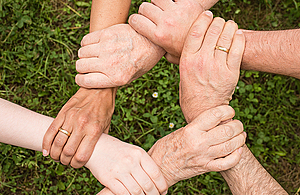Multi-million support for vulnerable children during COVID-19
Extra support to keep children at risk of neglect or abuse safe during the Coronavirus outbreak

Vulnerable children most at risk of neglect, violence or exploitation will benefit from extra support to keep them safe during the Coronavirus outbreak.
More than £12 million will be spent on 14 projects across the country to tackle the increased risk some children and young people are facing as they stay at home to reduce the spread of Coronavirus. This will include money to pay for individual support for families at risk of domestic abuse, community volunteers to work with families, and continued support for teenagers at risk of exploitation.
The money will benefit children in care and care leavers, and will be used to also support vulnerable children’s mental health and to provide practical and emotional help. This includes a package of funding to give young people in some project areas unlimited data on their phones for three months so they can stay connected and prevent them suffering from isolation.
The funding builds on the Government’s work to protect vulnerable children and young people’s wellbeing, that includes working with schools, social workers and local authorities to encourage them to continue attending school wherever appropriate.
Children and Families Minister Vicky Ford said:
I will always put the care and safety of vulnerable children first, especially at this time as they face unique challenges due to COVID-19. For many of these children, social distancing measures may present additional risks, whether from neglect or abuse at home or from strangers online.
We are working hand in hand with all the professionals supporting these children to prioritise their wellbeing during these unprecedented times. These new projects will prevent children suffering from isolation or exploitation as the country continues to respond to COVID-19.
The £12 million package includes work on:
-
Adolescent exploitation:
For teenagers across North London who experience multiple risks, bringing together NHS, social care, police, criminal justice and third sector services under one roof – a “child house” to support children and families affected by child sexual abuse and exploitation
-
Domestic abuse support:
Through a domestic abuse programme in Newham that works with whole families, to reduce the chances of it from happening in the first place through early intervention, and where a designated social worker will work intensively with families if risks escalate
-
Children in care:
Various programmes around the country to build lasting support networks for children and families in the care system including foster parents, to prevent social isolation at this time, as well as finding homes for young people leaving care;
-
Mental health support:
Families in Camden will receive a range of services from which families choose the ones they want to rely on, including mediation, mentoring, family therapy and youth support
Chief Social Worker for Children and Families Isabelle Trowler said:
It’s never been more important for children and their families to receive the support they need. In the true spirit of dedicated public service it is so heartening to see these projects adapting and continuing to deliver services in times of unprecedented challenge.
Education is a strong protective factor for many vulnerable children and young people, which is why the Government is also ensuring there is a place in nursery, school or college for them.
Alongside this, the Government has also set out significant support for services benefitting these young people and their families, including:
- Additional funding of £3.2 billion for local authorities, helping them meet additional demands including within children’s social care services at this time;
- £1.6 million to expand and promote the NSPCC’s helpline, offering advice and support on how to raise concerns about children at risk;
- £8 million from the Adoption Support Fund to help families under pressure as a result of the outbreak;
- Better data sharing between all safeguarding partners, making sure the NHS, police, social workers, school nurses and health workers have the information they need to protect children at risk of abuse;
- New teams of Department for Education and Ofsted staff leading work around the country to gather data on vulnerable children’s attendance at school or other settings, providing a overall picture of the risks facing these children so that councils can follow best practice;
- Tackling the barriers that many of them face, providing laptops and tablets for children with social workers and care leavers to help them keep in touch with the services they need;
- Providing continued funding for free school meals, so that eligible children benefit from this even if they are not in school; and
- More than £33 million for the Staying Put programme, supporting young people leaving care to continue living with their foster parents past age 18 and preventing the risk of becoming homeless, and a further £9 million to provide personal adviser support for care leavers through to 25, helping them into employment, education and training.
This comes after the Education Secretary asked local authorities to ensure that no one has to leave care during this difficult time.
Part of the Department for Education’s Children’s Social Care Innovation Programme, the funding announced today builds on investment worth almost £270 million since 2014, driving innovation and sharing best practice to improve outcomes for children by increasing the effectiveness and efficiency of children’s social care services.
DfE enquiries
Central newsdesk - for journalists 020 7783 8300
General enquiries - for members of the public 0370 000 2288
DfE coronavirus helpline - for members of the public 0800 046 8687
The opening hours for these telephone numbers are set out on the DfE homepage.